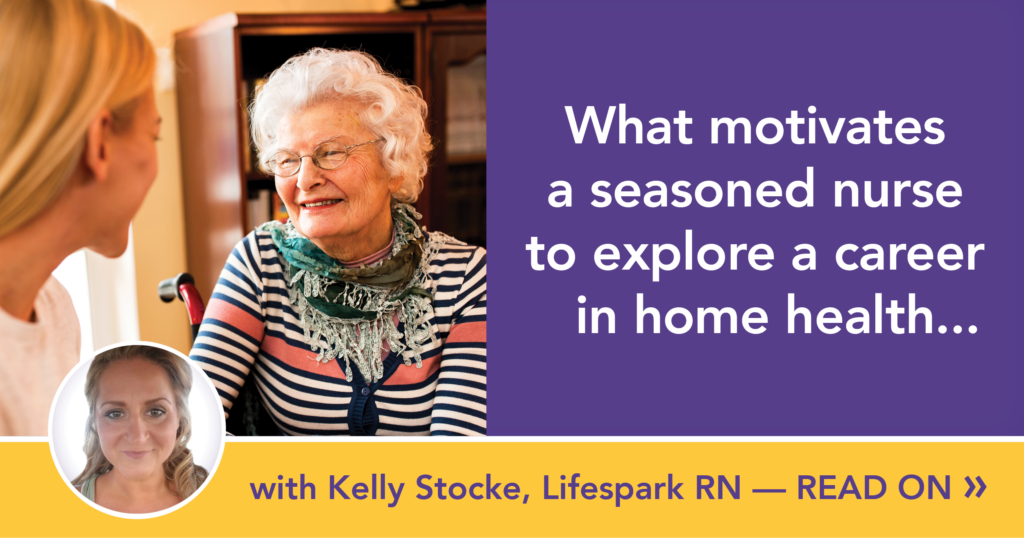
Working in skilled home health is not for everyone, but for many of the nurses who’ve joined Lifespark Home Health after years of hospital and clinic nursing, it’s a great fit, said Kelly Stocke, RN, Lifespark Home Health Clinical Educator.
What motivates a seasoned nurse to explore a career in home health varies from person to person, she said. For some, it’s the residual effects of the COVID pandemic which left many health care professionals feeling exhausted and burned out. Others are looking for more autonomy and independence, are curious about different types of nursing jobs, or just want to try something new.
“When I was working in the field as a Lifespark preceptor, nurses with ten or even 20 years of experience would tell me, ‘I’m learning to love nursing again’ and ‘I’m so glad I left the hospital,’” Kelly said.
Finding ways to connect
Before becoming a nurse, Kelly spent 20 years as a home-based social worker, so she was already comfortable in the home environment. “For nurses, LPNs, physical therapists, occupational therapists, home health aides, or social workers who are new to in-home care, it can take some practice to feel at ease in someone else’s home,” she said.
In her role as Clinical Educator, she reminds team members that it’s the client’s home and that it’s not their place to judge. Next, she suggests they look for something in the house that intrigues them—a craft project, painting, photograph, or memento—and to ask the client about it. “As soon as you find something to focus on, you’ll create a connection that will help you and your client feel more comfortable,” she said.
Really getting to know the client in their own environment is fundamental to Lifespark’s approach, Kelly said. “When you learn about their lives, their history, their traditions, and whenever possible, meet their families, you’ll come to appreciate them as a whole, unique person.”
Demands of charting
No matter how meaningful nursing often is, charting is the one part of the job that’s universally loathed. “As a nurse, you just want to focus on client care, but Medicare requires us to document in detail every step of every process, using very specific wording, and we’re working with high-acuity clients,” Kelly said. “For every lab draw, catheter change, or wound care application, there might be eight steps involved, but if you don’t chart it, it didn’t happen.”
When Kelly was in the field, she could sometimes write her narratives between appointments, but if traffic or weather was bad, she’d have to wait until evening. Since then, Lifespark has significantly shrunk the size of the territories and the number of visits to five clients per day, so there’s more downtime during the day to finish charting, she added.
Although charting was easier in the hospital where Kelly did her clinicals, she found the pace and the environment more stressful. “You go from one client to the next, with no time in between to decompress, so if it’s a difficult day—supplies weren’t ordered or a family was upset—I couldn’t stop to take a breath,” she said. “It’s a trade-off, but I’ll take charting over that kind of pressure any day.”
Culture of kindness and support
“Lifespark made me the nurse I am today, thanks to excellent preceptors who patiently taught me what I needed to know,” she said. “When I needed additional training — how to change a PICC line or draw blood — my coworkers put in extra time with me at the office using a mannequin until I had the skills and confidence to work with clients.”
From Kelly’s perspective, Lifespark’s culture of supporting each other and having a positive attitude starts from the top and is felt at every level of the organization, including clients and families. “Both my grandmothers had different home health providers before they became Lifespark clients, and now, whenever we talk, they always say, ‘Everybody in your company is so nice. You can tell that they love their jobs because they’re so happy,’” she said. “In this culture, negative people don’t stick around.”
What’s most important, Kelly said, is that everyone at Lifespark shares the mission of improving seniors’ lives.
If you’re interested in pursuing a nursing career at Lifespark, we’d love to meet you.


